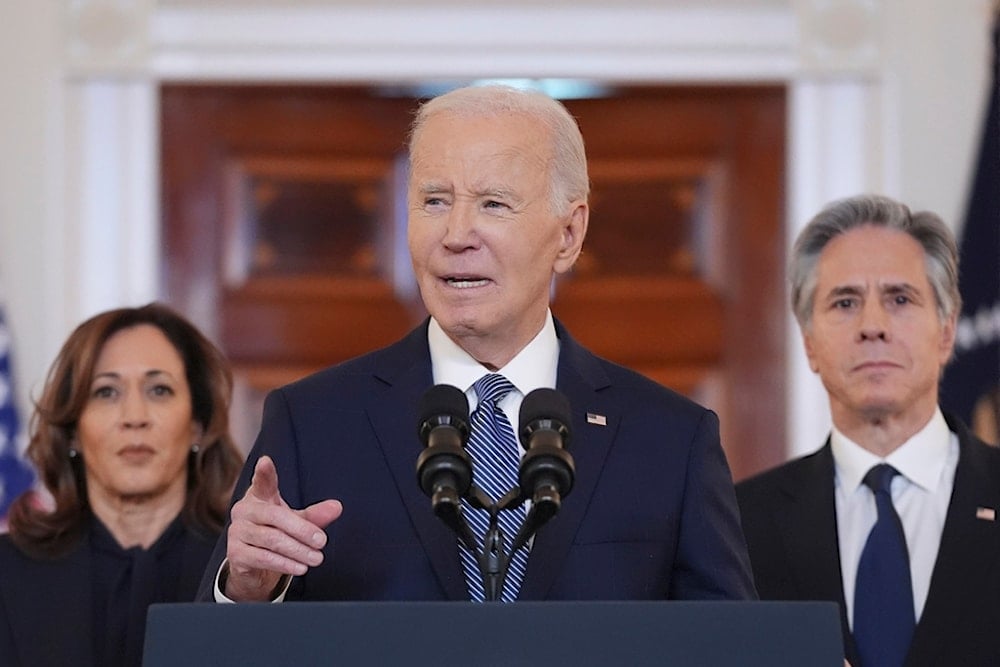Biden announces ceasefire deal between Israelis, Hamas
US President Joe Biden announced that "Israel" and the Palestinian Resistance have reached a ceasefire and prisoner exchange agreement, ending over a year of war in Gaza, with plans to halt fighting, reunite captives with families, and increase humanitarian aid.
-

President Joe Biden, center, with Vice President Kamala Harris, left, and Sec. of State Anthony Blinken, right, speaks in the Cross Hall of the White House on the announcement of a ceasefire deal in Gaza and the release of dozens of captives after more than 15 months of war, Wednesday, January 15, 2025, in Washington (AP)
US President Joe Biden revealed on Wednesday that "Israel" and the Palestinian Resistance have finalized a ceasefire and prisoner exchange deal, bringing an end to over a year of violence in Gaza.
The agreement, achieved through intensive negotiations led by the US, Egypt, and Qatar, is expected to halt hostilities, reunite captives with their families, and significantly increase humanitarian aid to Gaza.
"I can announce a ceasefire and a hostage deal has been reached between Israel and Hamas," Biden said at the White House. "Fighting in Gaza will stop, and soon the hostages return home to their families."
In a separate statement, the White House explained, "Today, after many months of intensive diplomacy by the United States, along with Egypt and Qatar, Israel and Hamas have reached a ceasefire and hostage deal. This deal will halt the fighting in Gaza, surge much-needed humanitarian assistance to Palestinian civilians, and reunite the hostages with their families after more than 15 months in captivity."
Reporter: Who gets credit for this? You or Trump?
— Acyn (@Acyn) January 15, 2025
Biden: Is that a joke? pic.twitter.com/mca4y6HVyL
Deal reached after lengthy delays
The deal comes after protracted violence that has devastated Gaza and intensified the humanitarian crisis. Negotiations faced numerous delays due to unresolved issues between the parties.
According to Palestinian sources familiar with the talks, one of the main sticking points was the lack of clarity from "Israel" regarding the mechanism for the release of captives and the evacuation of injured individuals for medical treatment.
Additionally, the Israeli side did not provide a clear map outlining the withdrawal of its forces from Gaza or the management of key points like the Rafah crossing and the entry of humanitarian aid trucks. These unresolved details disrupted the progress of the agreement, prolonging the suffering of civilians in the region.
Despite these challenges, Arab, American, and Israeli officials confirmed earlier this week that the draft agreement was nearing completion.
Key terms of the ceasefire agreement
Details of the agreement obtained by Al Mayadeen reveal an eleven-clause framework aimed at addressing both immediate humanitarian concerns and longer-term conflict resolution. Key provisions include:
- Israeli withdrawal: Israeli forces are to fully withdraw from all areas of the Gaza Strip, returning to pre-war borders, including al-Rashid Street and the Netzarim corridor.
- Humanitarian access: The Rafah crossing will be reopened under international protocols, with "Israel" permitting the daily entry of 600 aid trucks. Provisions include medical supplies, 200,000 tents, and 60,000 caravans for shelter.
- Injured evacuation: "Israel" is required to facilitate the evacuation of injured Palestinians for treatment abroad.
- Prisoner exchange: The agreement includes the release of 1,000 Palestinian detainees, as well as all women and children under 19 held in Israeli prisons. The deal excludes Hamas fighters involved in Operation al-Aqsa Flood.
- Airspace and hospitals: Hostile aircraft must vacate Gaza's airspace for up to 10 hours daily, and all hospitals in Gaza are to be rehabilitated, with field hospitals and medical teams allowed entry.
Implementation phases
The ceasefire is structured in phases, starting with a six-week period during which 33 Israeli captives, including "children, women, female soldiers, men above 50, and the wounded and sick," will be released in exchange for 1,000 Palestinian detainees. This phase also enables displaced persons from southern Gaza to return to northern areas as Israeli forces gradually withdraw.
Subsequent stages will address the release of the remaining 66 captives held by Palestinian factions, contingent on the success of the initial phase. According to reports, the release of 33 hostages, including five female soldiers, will involve significant concessions, with each soldier exchanged for 50 Palestinian prisoners.

 4 Min Read
4 Min Read








